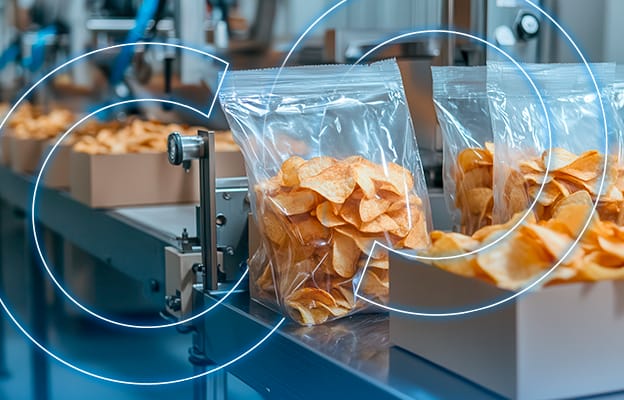How Private Labeling Assists Grocery Retailers with Navigating Tariff Laws

Food and beverage production is a massive industry in the U.S. More than 15% of manufacturing workers are employed by food brands, a sector that drives about 16.8% of all manufacturing sales, reported the USDA in 2024.
According to consulting firm Camoin Associates, the food and beverage industry generated $534.3 billion of U.S. gross domestic product in 2023 and continues to grow at a significant rate. Interestingly, one of the fastest growing markets within the industry is private label food goods, brands that often offer excellent value for the price.
In fact, sales of private label goods were expected to rise north of $250 billion in 2024, according to industry estimates.
In the wake of the recent presidential election, this sprawling industry is now bracing for significant changes and substantial tariffs on imports from Mexico and Canada.
For grocery retailers with private label brands, which often operate on thinner margins and rely heavily on international supply chains, these tariffs represent both an immediate threat and a strategic inflection point.
How the grocery industry respond in the coming months could determine which brands strengthen their market position and which ones struggle to maintain profitability.
The Tariffs: What's Actually Changing?
Recent tariffs on imports from Mexico and Canada mark a significant shift in North American trade policy.
These tariffs would impact a broad spectrum of food-related imports, including:
- Fresh produce: Fruits and vegetables, with Mexico supplying approximately 70% of U.S. fresh vegetable imports and nearly 40% of fruit imports
- Protein sources: Meat (particularly beef and pork) and seafood
- Dairy products: Cheese, butter and milk ingredients from Canada
- Grains and ingredients: Various raw materials used in processed foods
- Beverages: Impacting everything from Mexican beer to Canadian whiskey
- Packaging materials: Aluminum and steel for canned goods and containers
For private label grocery manufacturers, these changes are particularly consequential.
Unlike national brands with deeper pockets, private label producers often operate with leaner teams and tighter margins, making them more vulnerable to sudden cost increases and supply chain disruptions.
How Tariffs Will Reshape the Private Label Grocery Landscape
The most immediate impact will be felt on balance sheets.
With ingredient costs potentially rising 25% overnight for certain items, private label brands face difficult decisions that could impact their bottom lines in various ways.
- Pass costs to consumers: Raising retail prices risks losing the price advantage that many private labels rely on for competitive positioning
- Absorb the costs: Squeezing already thin margins can threaten long-term viability
- Implement “shrinkflation”: Reducing product sizes while maintaining price points may help in the short term but risks consumer backlash
- Reformulate products: Substituting ingredients can maintain price points but potentially compromise quality
Interestingly, this disruption may create unexpected advantages for some private label brands.
If national brands implement substantial price increases, private labels that can maintain smaller price gaps may actually gain market share as value-conscious consumers trade down.
Supply Chain Vulnerabilities Exposed
Beyond immediate cost impacts, these tariffs will expose vulnerabilities in supply chains that have been optimized for efficiency rather than resilience.
- Just-in-time inventory systems: Once considered best practice, these systems leave little buffer for disruption
- Limited supplier diversification: Many private label manufacturers have consolidated suppliers to maximize volume discounts
- Seasonal dependencies: Particularly for produce-based products that rely on Mexican imports during winter months
We’re already seeing some manufacturers respond by stockpiling key ingredients like coffee beans, avocados and certain grains.
However, this strategy has limitations with storage costs, product shelf life and capital constraints all present challenges, especially for smaller private label producers.
Shifting Consumer Behavior Creates New Opportunities
Economic pressures typically drive consumers toward private label products and tariff-induced inflation may accelerate this trend.
A recent McKinsey study found that 45% of consumers have already increased their private label purchases due to inflation and tariffs could amplify this shift.
For retailers, this represents an opportunity to strengthen their private label programs by:
- Highlighting “Made in USA” products: Products sourced domestically may become relatively more competitive
- Introducing tiered private label offerings: Creating good-better-best options within private label portfolios
- Leveraging private labels as inflation hedges: Positioning store brands as smart options for budget-conscious shoppers
For food manufacturers that produce both branded and private label products, this environment demands careful portfolio management to avoid cannibalizing their own national brands.
Strategic Approaches for Private Label Grocery Success Amid Tariffs
Agile and quick-moving private label grocery manufacturers are already revising their product development strategies.
Although there are no one-size-fits all solutions, here’s a look at some strategies private label brands are employing to offset the effects of tariffs.
- Ingredient optimization: Identifying non-essential imported ingredients that could be reformulated with domestic alternatives
- Strategic price positioning: Carefully analyzing price elasticity across categories to determine where costs can be passed through versus absorbed
- Long-term contracts: Negotiating extended pricing agreements with retail partners to smooth the impact of tariff implementation
- Packaging innovation: Exploring alternative packaging solutions that reduce reliance on tariff-affected materials
A private label manufacturer of canned vegetables, for example, may consider working with domestic farmers to expand acreage for certain crops previously sourced from Mexico and anticipating both higher costs and potential supply disruptions.
Reimagining Supply Chain Strategies
Forward-thinking private label manufacturers are using this disruption as a catalyst for supply chain management and transformation.
- Geographic diversification: Exploring alternative sourcing regions outside Mexico and Canada that aren’t subject to the same tariffs
- Vertical integration: Considering strategic investments in upstream production or processing capabilities
- Nearshoring certain operations: Moving some production closer to end markets when feasible
- Buffer stock management: Developing more sophisticated inventory models that balance risk mitigation with capital efficiency
A private label producer for a major grocery retail chain has already begun developing relationships with suppliers in Peru and Chile as alternatives to Mexican avocado sources, not to replace them entirely, but to create optionality and leverage in negotiations.
If tariff landscapes do change in the near future, the organization will now have sourcing options and flexibility that they lacked before.
Leveraging Technology to Navigate Complexity
The most resilient private label manufacturers will harness technology to navigate these challenges:
- Digital twin modeling: Creating virtual representations of supply chains to test scenarios and identify vulnerabilities
- AI-powered forecasting: Deploying advanced analytics to better predict demand and optimize inventory levels
- Blockchain for transparency: Implementing systems that provide end-to-end visibility into supply chains
- Product lifecycle management (PLM): Using specialized software to streamline reformulation and accelerate time-to-market for adapted products
These technological capabilities are no longer luxuries, they’re becoming table stakes for companies that need to rapidly model tariff impacts, test alternative formulations and manage increasingly complex supplier networks.
Building Stronger Retailer Partnerships
The relationship between private label manufacturers and grocery retailers becomes even more critical during periods of economic disruption:
- Collaborative forecasting: Working together to anticipate demand shifts and plan production accordingly
- Transparent cost modeling: Sharing the real impact of tariffs to facilitate fair pricing discussions
- Joint innovation: Cooperating on product development that addresses cost constraints while maintaining quality
- Risk-sharing agreements: Developing contracts that equitably distribute tariff-related costs and risks
Private label manufacturers who approach grocery retailers as strategic partners rather than simply vendors will be better positioned to navigate these challenging waters.
Preparing for Further Disruption
The tariff situation is unlikely to remain static.
Both Canada and Mexico have indicated they may implement their own retaliatory tariffs, potentially creating second-order effects for U.S. food exporters and further complicating global supply chains.
To prepare for even more changes, food and beverage brands can:
- Monitor policy developments closely: Staying informed about trade negotiations and potential countermeasures
- Assess vulnerability to retaliatory tariffs: Understanding exposure to exports that might be targeted
- Prepare contingency plans: Developing response strategies for various scenarios
Perhaps the greatest challenge is uncertainty around how long these tariffs will remain in place.
Some analysts predict they could persist for years, while others suggest they may be used as temporary leverage in broader trade negotiations.
This uncertainty demands:
- Scenario planning: Developing strategies for both short-term and long-term tariff environments
- Staged investments: Prioritizing supply chain modifications that deliver value regardless of tariff duration
- Policy advocacy: Engaging with industry associations to communicate impacts to policymakers
Preparing for a Transformed Competitive Landscape
The combined pressures of tariffs, inflation and changing consumer behavior will likely accelerate consolidation in the private label manufacturing sector. Companies with stronger balance sheets and more resilient supply chains will be positioned to acquire struggling competitors or gain market share.
Forward-thinking manufacturers are already:
- Evaluating acquisition opportunities: Identifying potential targets that might become available at attractive valuations
- Strengthening core capabilities: Investing in areas of distinct competitive advantage
- Streamlining portfolios: Focusing resources on categories with the strongest prospects
Embracing Agility in an Era of Disruption
While the role and effects of tariffs unfolds, the private label food sector stands at a crossroads.
Rising costs and duties present significant challenges, to be sure, but they also create opportunities for companies willing to transform their operations.
Those that take a proactive, strategic approach will not merely survive but may emerge stronger and more competitive.
The most successful private label food manufacturers will:
- Embrace agility in product development and sourcing
- Build redundancy and flexibility into their supply chains
- Leverage technology to manage complexity and enable rapid response
- Strengthen partnerships across their ecosystem
- Use disruption as a catalyst for transformation rather than merely a challenge to overcome
In this environment, having the right tools and systems becomes critical. Modern product lifecycle management (PLM) solutions provide the visibility, analytics and collaboration capabilities needed to navigate tariff-related disruptions successfully.
Private label manufacturers and the grocery retailers they serve must rethink how they develop, source and bring products to market in this new tariff landscape. Those that do will be positioned to turn economic headwinds into a sustainable competitive advantage.
Build Tariff Resilience into Your Grocery Retail Strategy
For food brands and grocery retailers looking to build greater agility in their private label operations, technology will be a critical enabler, even more than it has in the past.
Centric PLM Software® provides the digital foundation needed to navigate tariff disruptions successfully, from scenario modeling and supplier management to accelerated reformulation and transparent cost analysis. Our specialized solutions for the food and beverage industry help brands and retailers respond quickly to changing market conditions while maintaining quality and profitability.









